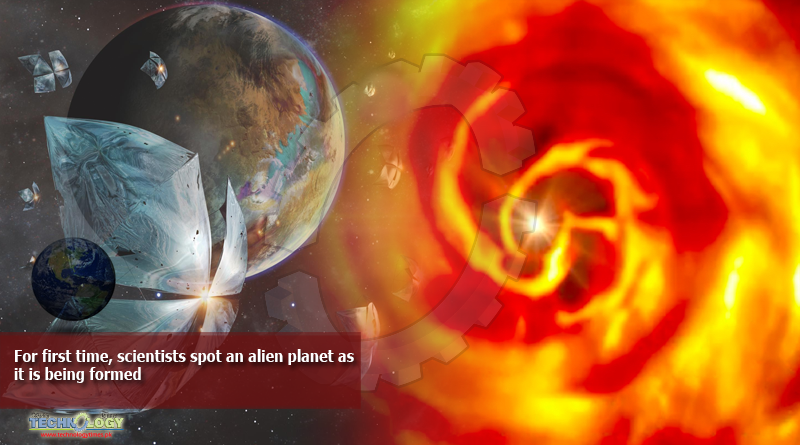Astronomers have gazed into what appears to be a planetary maternity ward, observing for the first time within a huge disk of dense gas and dust surrounding a newly formed star a spot an alien planet in the process of being born.

This large young planet is forming around a star called AB Aurigae that is about 2.4 times the mass of the sun and located in our Milky Way galaxy 520 light years from Earth, researchers said on Wednesday. A light year is the distance light travels in a year, 5.9 trillion miles (9.5 trillion km).OTHER STORIES121 people returned to Leyte under Balik Probinsiya program — PalaceSEC reminds lenders of mandatory grace period on loans falling due in ECQ, MECQERC to extend bill payment suspension for poor households to six months
The scientists used the European Southern Observatory’s Very Large Telescope in Chile to spot a spiral structure within the swirling disk around AB Aurigae generated by the presence of a planet. They detected a “twist” pattern of gas and dust in the spiral structure marking where the planet was coalescing.
“It takes several million years for a planet to be in its final stage, so birth is not well defined in time. However, we can say that we were likely able to catch a planet in the process of formation,” said Observatoire de Paris astronomer Anthony Boccaletti, who led the research published in the journal Astronomy & Astrophysics.
More than 4,000 planets have been discovered orbiting stars beyond our solar system. Scientists are eager to learn more about how they are born as cold gas and dust consolidate in these disks surrounding new stars.
The planet is located about 30 times further from its star than Earth’s distance from the sun – about the distance of the planet Neptune in our solar system, Boccaletti said. It appears to be a large gas planet, not a rocky planet like Earth or Mars, and may be more massive than our solar system’s largest planet Jupiter, Boccaletti added.
A top US scientist said on Wednesday that governments should not count on a successful vaccine against COVID-19 being developed anytime soon when deciding whether to ease restrictions imposed to curb the pandemic.advertisement
William Haseltine, a groundbreaking researcher of cancer, HIV/AIDS and human genome projects, said the better approach now is to manage the disease through careful tracing of infections and strict isolation measures whenever it starts spreading.
While a COVID-19 vaccine could be developed, he said, “I wouldn’t count on it.”
Vaccines developed previously for other types of coronavirus had failed to protect mucous membranes in the nose where the virus typically enters the body, he said.
Even without an effective treatment or vaccine, the virus can be controlled by identifying infections, finding people spot an alien planet who have been exposed and isolating them, he said. He urged people to wear masks, wash hands, clean surfaces and keep a distance.OTHER STORIESDILG to issue guidelines for Eid’l Fitr observance amid COVID-19 pandemicNBA to issue guidelines around June 1 on recalling players –reportUS airlines step up safety measures in preparation for recovery
He said China and some other Asian countries used that strategy successfully, while the United States and other countries did not do enough to “forcibly isolate” all who were exposed to the virus.
China, South Korea and Taiwan have done the best at curbing infections, he said, while the United States, Russia and Brazil have done the worst.
Tests on animals of experimental COVID-19 vaccines had been able to reduce the viral load in organs like lungs although the infections remained, he said.
For treatment, patients have been getting antibody-rich plasma donated by people who recovered from COVID-19, and drugmakers are at work producing refined and concentrated versions of that serum.
Known as hyperimmune globulin, those products are “where the first real treatments are going to be,” he said, predicting success also with research into monoclonal antibodies that home in on and neutralize the ability of the virus to enter human cells
Originally Publish at: https://www.gmanetwork.com/
